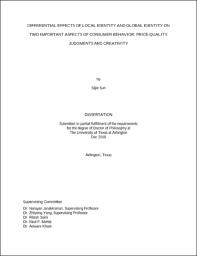
ATTENTION: The works hosted here are being migrated to a new repository that will consolidate resources, improve discoverability, and better show UTA's research impact on the global community. We will update authors as the migration progresses. Please see MavMatrix for more information.
Show simple item record
| dc.contributor.advisor | Janakiraman, Narayan | |
| dc.contributor.advisor | Yang, Zhiyong | |
| dc.creator | Sun, Sijie | |
| dc.date.accessioned | 2021-01-12T17:40:32Z | |
| dc.date.available | 2021-01-12T17:40:32Z | |
| dc.date.created | 2018-12 | |
| dc.date.issued | 2018-12-06 | |
| dc.date.submitted | December 2018 | |
| dc.identifier.uri | http://hdl.handle.net/10106/29684 | |
| dc.description.abstract | Globalization has substantially influenced the world economy and also individuals. As a person with a cross-cultural background, it is fascinating to observe that different identities change individuals’ behavior. My dissertation focuses on cultural psychology and creativity with a specific focus on analyzing the effect of consumers’ local or global identity influences different aspects of consumer decision-making. In the first essay, consumers often rely on price to judge a product’s quality, especially when they do not have sufficient knowledge about attributes.However, how is such a tendency affected by consumers’ local-global identity, product type(e.g., services vs. goods; hedonic vs. utilitarian), and distribution of customer ratings (convergent vs. divergent)? What ad appeals can be developed to enhance or reduce such a tendency? In this research, we propose that consumers’ local (vs. global) identity leads to a greater tendency to make price-perceived quality (PPQ) associations. Perceived quality variance among comparison brands is a key mechanism underlying these effects. Two field studies (Studies 1 and 7), seven experiments (Studies 2-6, 8, and 9), and a systematic review of secondary data (follow-up study of Study 7) provide converging and robust evidence for the effect of local-global identity on PPQ associations. Consistent with the “perceived quality variance” account, when quality differences among the brands are made salient, PPQ associations of consumers high in global identity (but not local identity) significantly increase, compared to baseline conditions. However, when perceived quality differences are reduced, PPQ associations of consumers high in local identity(but not global identity) significantly decrease. Moreover, product type and distribution of customer ratings represent natural boundaries for the relationship between local-global identity and PPQ associations. We conclude with the implications for managers’ targeting endeavors. We also provide specific tools that marketers can use in ads and POP materials to encourage or discourage them from making PPQ associations. In the second essay, five studies examine the effect of consumers’ local-global identity on creativity and show that individuals with a local identity (compared vs. global identity) are more creative, due to greater relationship focus. When relationship focus is externally enhanced, creativity among consumers high in global identity(but not high in local identity) increases, and when relationship focus is externally suppressed, consumers high in local identity (but not high in global identity) decreases. | |
| dc.format.mimetype | application/pdf | |
| dc.language.iso | en_US | |
| dc.subject | Local-global identity | |
| dc.subject | Price-quality judgement | |
| dc.subject | Creativity | |
| dc.title | DIFFERENTIAL EFFECTS OF LOCAL IDENTITY AND GLOBAL IDENTITY ON TWO IMPORTANT ASPECTS OF CONSUMER BEHAVIOR: PRICE-QUALITY JUDGMENTS AND CREATIVITY | |
| dc.type | Thesis | |
| dc.degree.department | Marketing | |
| dc.degree.name | Doctor of Philosophy in Marketing | |
| dc.date.updated | 2021-01-12T17:40:33Z | |
| thesis.degree.department | Marketing | |
| thesis.degree.grantor | The University of Texas at Arlington | |
| thesis.degree.level | Doctoral | |
| thesis.degree.name | Doctor of Philosophy in Marketing | |
| dc.type.material | text | |
Files in this item
- Name:
- SUN-DISSERTATION-2018.pdf
- Size:
- 362.3Kb
- Format:
- PDF
This item appears in the following Collection(s)
Show simple item record


